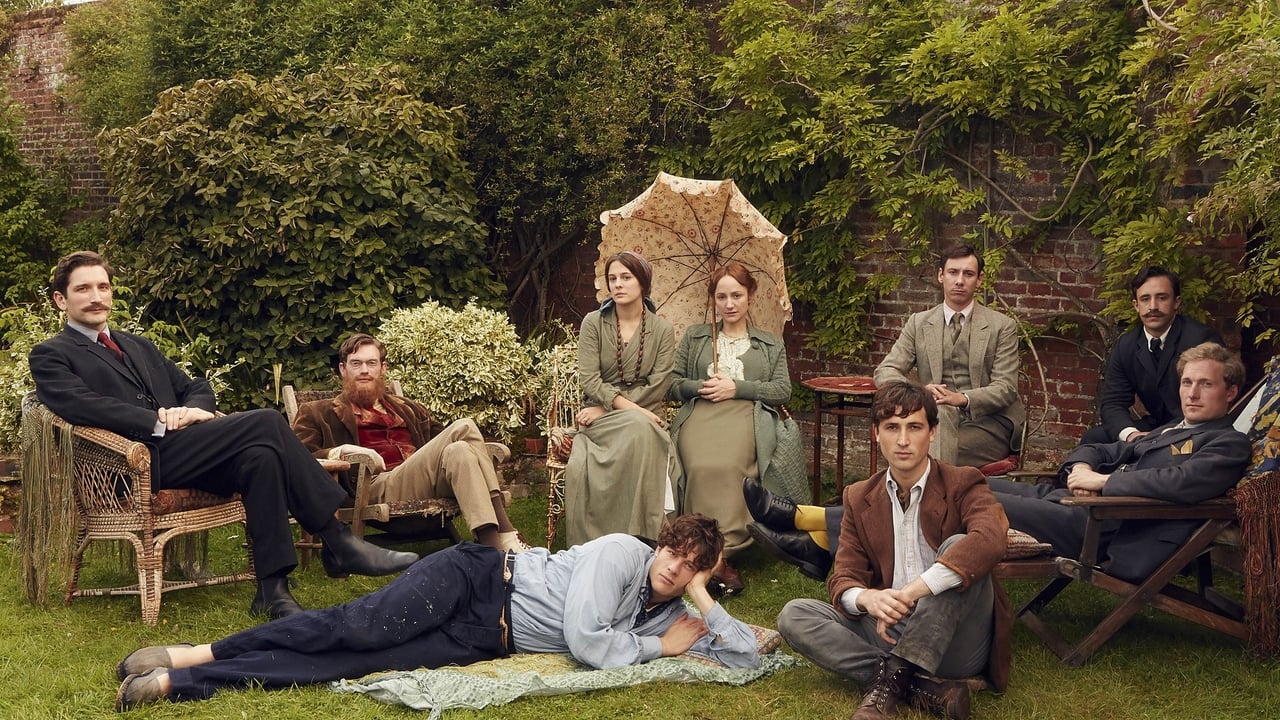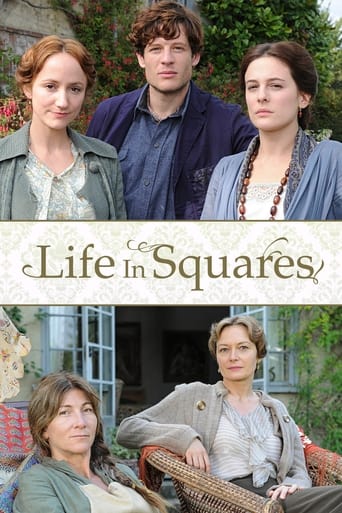



Very very predictable, including the post credit scene !!!
View MoreI like the storyline of this show,it attract me so much
View MoreDisturbing yet enthralling
Instead, you get a movie that's enjoyable enough, but leaves you feeling like it could have been much, much more.
View MoreAlthough I did not expect it, I found LIFE IN SQUARES to be a remarkable piece of television drama, offering insights into the lives of the Bloomsbury Group that I had never previously thought of.The title is a clever one, suggesting the bourgeois existence of the Stephen sisters Virginia and Vanessa (played by Lydia Leonard, Eve Best, Phoebe Fox, and Catherine McCormack across the three-episode structure) where they grew up in luxury, but also denoting imprisonment, both mental and emotional. David Roger's production designs, with elegant rooms heavily over-stuffed with curios of all historical periods, restrict the actors' freedom of movement; they are forced to move round chairs, or negotiate too many ornaments. When the Bloomsbury Group meet for their regular soirées, they do so in small, confined rooms, with little room to breathe.This kind of goldfish-bowl lifestyle inevitably has a significant effect on the Group's life-choices. While dedicating themselves to ideals of artistic purity that transcend the mundane concerns of early twentieth century Britain, we wonder whether that represents nothing more than a form of futile release from conformity. This is especially summed up in Vanessa Bell's checkered career; a talented artist in her own right, she becomes so much subject to her husband Clive's (Sam Hoare/ Andrew Havill's) bidding that she ends up losing her artistic will. She embarks on a long-term relationship with Duncan Grant (James Norton/ Rupert Penry-Jones), but finds little emotional satisfaction there - despite his undying devotion to her, he remains a professed homosexual.Virginia experiences equal pains. We know from the start that she is mentally fragile, but it seems that her sister's overbearing nature, coupled with the prevailing ideology that all wives should have children at that time, pushes her into marriage with Leonard Woolf (Al Weaver. Guy Henry), Although the two enjoy a tranquil and often fulfilling life, it is not what Virginia wants. She tries to find solace in her writing, but even that is not enough to prevent her from committing suicide at the outbreak of World War II. From this drama, we get the sense of terrible sorrow that such an innovator should have felt so hemmed in by social and mental pressures that she should take her own life.The sisters' existence does not change, even when they sacrifice London for the country, and Vanessa's family moves into Charleston, an idealized retreat still open to general visitors. Life there becomes even more claustrophobic, especially when Duncan's boyfriend David Garnett (aka Bunny) (Ben Lloyd-Hughes/ Jack Davenport) moves in. Vanessa is often forced into the role of unwilling peacemaker; at length she ends up doing something that she felt she must do, but ends up causing her lasting mental pain and suffering.What makes LIFE IN SQUARES such a game-changing piece is that its sympathy extends to male and female characters alike. Would-be critics like Roger Fry (Elliott Cowan) are trying to make their way in the world as they pronounce on the effect of Modernism on the post-1918 universe, but they appear to lack the conviction to do so. This is chiefly due to their environment; the hothouse world of London (and provincial) society is so insulated from from worldly affairs that it ends up feeding on itself.Brilliantly directed by Simon Kaijser from a script by Amanda Coe, LIFE IN SQUARES offers important material for reflection on the power as well as the limitations of the imagination, and how we must remain mindful of ourselves and our well-being rather than subjecting ourselves to the often restrictive dictates of prevailing socio-economic convention.
View MoreLife in Squares is a confusing and dull three part period drama about the tangled love affairs of the Bloomsbury Group.Virginia (Lydia Leonard) married Leonard Woolf (Al Weaver) who soon realises that she is mentally fragile, while her sister Vanessa (Phoebe Fox) turned her affections towards Duncan Grant (James Norton) who teams up with her and his male lover. In fact Grant is the love and leave em kind when it comes to male relationships.As the drama progresses the younger actors are replaced by an older set of actors and the Bloomsbury group attitude towards free love and creativity gets bleaker as World War Two approaches and losses are felt.Amanda Coe's script was not easy to follow and seemed sparse which explains why I felt bored and listless.Scandinavian director Simon Kaijser goes for Nordic noir pacing and a murky look which did not work for this three parter that needed to be faster moving and brighter.
View MoreI recorded this mini series because being a fan of Woolf's writing and being interested in Keynes I was interested in the topic. I delayed watching it because of the potential for lascivious sexism and cliché I have observed in other artistic works regarding the Bloomsbury set. I started watching it when I was ill and was gripped. I like the way the author focused on Vanessa Bell and the avoidance of sexist representations of the women, as is so often the case, especially where there is a break from accepted relationship convention.I was so glad the author just introduced some characters by name and didn't over explain who everyone was and list their achievements. Unlike a previous reviewer I was glad the snobbishness and self importance and flaws of individuals was not written out. I particularly enjoyed the inclusion of angelica's experience. This took the examination of the group far beyond previous works I have encountered, giving the story some real emotional meaning.Over all this series seemed to me to be an exploration of relationships. It reminded me of Phillip Larkin's poem of parenthood.
View MoreI TRIED (I really did) with the first episode of LIFE IN SQUARES but after twenty minutes my brain started to dig a tunnel through my spine and tried to escape the UTTER TEDIUM of this smug little series. Worse, the episode moved with all the speed and urgency of a glacier, unlike my brain digging the escape tunnel. It was like being trapped in a room with a gang of self-regarding teenage Hipsters and Emos all moving in slow motion because of clinical depression. Frankly (and this is rare) I gave up after that twenty minutes and I won't be returning.Were the Bloomsbury Set a significant collection of artistic types who paved the way for the freedoms we enjoy today or a bunch of tedious and ultimately irrelevant posers only of interest to similar posers who write long serials for the BBC? Discuss.
View More